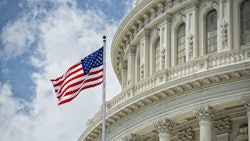
While some have speculated that the U.S. Drug Enforcement Administration (DEA) is on the cusp of deciding whether to accept or reject the Department of Health and Human Services (HHS) recommendation to reschedule cannabis under the Controlled Substances Act (CSA), Shane Pennington, partner at Porter Wright Morris & Arthur LLP, has a different perspective. He believes it could be after the 2024 presidential election before federal officials come to a decision on cannabis’s Schedule I status.
As Cannabis Business Times previously reported, the HHS recommended in August that cannabis be reclassified under the CSA, which currently lists cannabis as a Schedule I drug alongside heroin and LSD. HHS officials have not confirmed publicly the details of its recommendation, but Bloomberg, which broke the news, reported that it viewed an unredacted letter sent to the DEA that indicated a suggested move to Schedule III. The DEA must now decide whether it will accept or reject that recommendation, a process that Pennington says may take longer than industry stakeholders would like.
RELATED: 'Descheduling Would Not Be Utopia'
“Where we are in the process is still very early,” Pennington says. “DEA has HHS’ recommendation, which is an important step, but it’s very preliminary because now we’re going to get, eventually, a proposed rule from DEA, then we’ll get notice and comment for 60 days, [a] public participation period. And at the same time, DEA will allow interested parties to request hearings on the record.”
Then, Pennington says, the DEA will write a final rule, which must be published in the federal register for 30 days before it becomes effective.
“There are some exceptions to that, but the DEA generally requires a 30-day delay between the time it’s published and the time it becomes effective,” he says. “And so, for those who are really wanting to know, can this get done by the election, which I think is a question that many people are asking, my view is because of everything I just said, probably not. Because no matter how much the president or [DEA Administrator] Anne Milgram wanted to get done that fast, those processes take time.”
Pennington notes that the president and Milgram have no control over how long the rescheduling process takes; for example, they cannot stop the public from commenting or limit how many comments come in, nor can they decide how many people request hearings or how long those hearings take.
“Because of those reasons, I am not as bullish as others are on this getting done,” Pennington says. “But that has nothing to do with thinking that the president doesn’t think it’s a priority or thinking that DEA has any particular view of it. That’s just because of the way that the process works. In my knowledge of the historical practice, it normally takes years and years for this to get done.”
The DEA recently sent a letter to U.S. Rep. Earl Blumenauer, D-Ore., in response to Blumenauer and 30 of his colleagues sending a letter to Milgram in October that praised the ongoing review of how cannabis is scheduled and urging officials to deschedule cannabis entirely.
RELATED: 31 Bipartisan House Lawmakers Urge DEA to End ‘Failed’ Cannabis Prohibition
“On Aug. 29, 2023, DEA received a letter from the Department of Health and Human Services (HHS) providing its findings and recommendation on marijuana scheduling, pursuant to President Biden’s request for an administrative review,” Michael Miller, acting chief of the DEA’s Office of Congressional Affairs, wrote in the Dec. 19 letter to Blumenauer. “As part of this process, HHS first conducts a scientific and medical evaluation, and then DEA conducts its own review. DEA has the final authority to schedule, reschedule or deschedule a drug under the Controlled Substances Act, after considering the relevant statutory and regulatory criteria and HHS’s scientific and medical evaluation. DEA is now conducting its review.”
The letter, first reported by Punchbowl News, sparked concern from some that the DEA intended to deviate from the HHS’ recommendation.
Pennington, however, says that it is widely known at this point that the DEA has final authority to reschedule or deschedule cannabis.
“This has been repeated over and over and over, and that’s not news,” Pennington says. “I’ve seen a lot of people thinking that it is, that it’s some sort of posturing or the DEA is signaling that it’s going to depart from HHS’ recommendation. I mean maybe DEA is—I’m not taking a position on that—but this would not be news of that because this has been what they’ve said all along.”
In the meantime, while the industry eagerly awaits the DEA’s decision on the HHS’ rescheduling recommendation, Pennington says Congress may still choose to reschedule or deschedule cannabis through the legislative process, just as it did when it legalized hemp through the 2018 Farm Bill.
“Congress can do whatever it wants, and it should be said that if DEA does this—moves it to Schedule III, say—and then a new administration comes in, there’s nothing stopping Congress from just saying, ‘Oh, we want it back in Schedule I. … And then we’d be back at square one.”

























